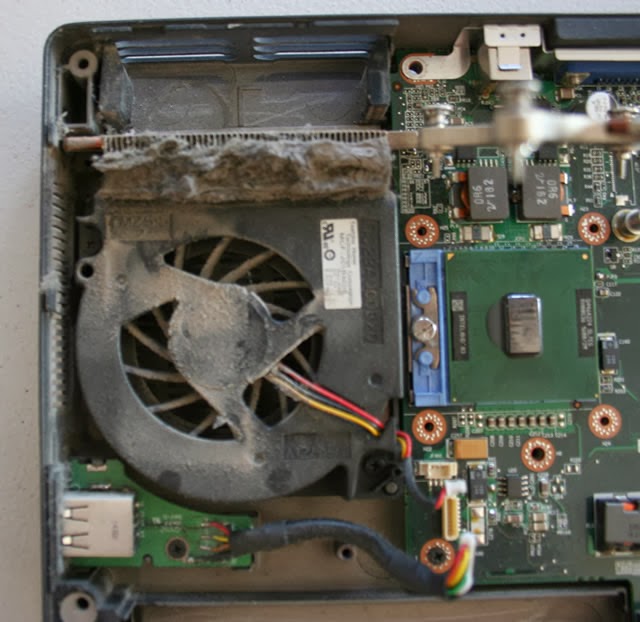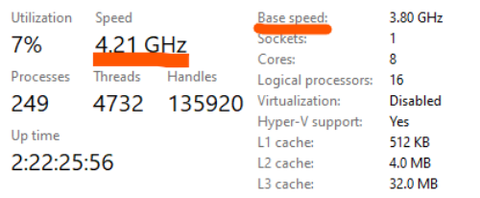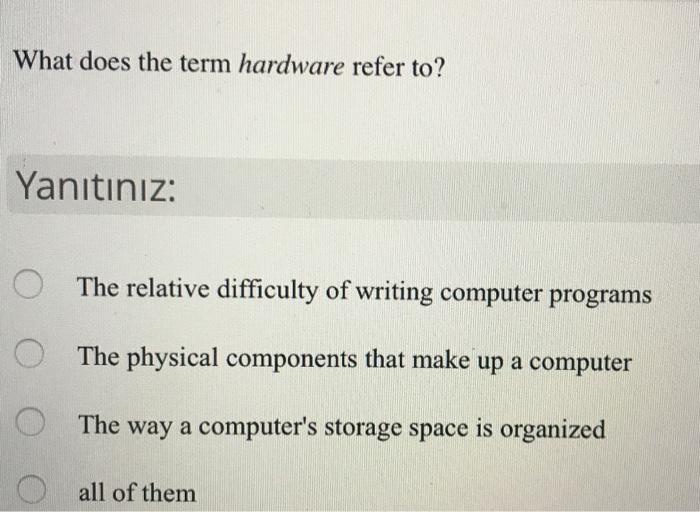Decoding Laptop Performance: What Processor Speed is Good for Your Laptop?
Introduction
When shopping for laptops, one term you will regularly come across is 'processor speed.' But what exactly does this term mean? And more importantly, what processor speed is good for a laptop? With numerous options available, ranging from 1GHz to above 3GHz, it can be challenging to figure out which one suits your needs the best. In this comprehensive guide, we will decode processor speeds, explore their impact on laptop functionality, identify ideal speeds for different users, and how it collaborates with other laptop parts. In the end, you will know how to make an informed decision the next time you are laptop hunting.
What Does Processor Speed Mean for Your Laptop?
In the heart of your laptop exists the processor or Central Processing Unit (CPU), often referred to as the brain of the laptop. Precisely, the lap speeds up according to the speed of the processor. Higher the speed or GHz (gigahertz), faster the processing of data and execution of instructions.
Key attributes of Processor Speed:
- Execution of Commands: Processor speed dictates how quickly your laptop can run applications and perform tasks.
- Handling Multiple Tasks: A superior processor speed delivers enhanced proficiency in multitasking, allowing you to run several applications concurrently.
- User Experience: Ideal processor speed contributes to improved user experience by providing smooth navigation and quick response.
Consequences of Processor Speed on Laptop Functionality :
- Positives: Increased processor speed significantly enhances the performance of the laptop, allows quicker file loading, responsive multitasking, and swift application launching.
- Negatives: On the flip side, processors with higher speed generate more heat, elevating overheating risks if not adequately mitigated. Furthermore, higher processor speeds may drain your battery at a quicker pace.
Ultimately, the effective translation of the processor speed into functionality varies as per the nature of tasks and individual requirements of the user.
How Does Processor Speed Impact Your Laptop's Functionality?
The speed of a laptop’s processor greatly influences its performance. Here's how:
1. Enhanced Performance:
High-speed processors ensure that tasks are executed swiftly and smoothly, escalating the laptop's overall performance and efficiency.
2. Capability to Handle High-Intensity Tasks:
Laptops with high-speed processors (above 3GHz) are ideal for intense tasks such as gaming, video editing, or running heavy software since they offer smoother multitasking and swift processes.
Meanwhile, processor speeds also bring in certain disadvantages:
1. Potential Overheating Issues:
High-speed processors tend to generate more heat. If not adequately cooled, your laptop could overheat, causing potential damage.
2. Quick Battery Drain:

Faster processors often consume more power, leading to rapid battery drain. A processor with a speed of 3GHz may reduce the battery life by around 20% compared to a 2GHz model.
In essence, high processor speeds can significantly boost a laptop's performance, especially for demanding tasks. However, it is essential to understand that the speed must balance effectively with other factors, including adequate cooling measures and sufficient battery life. This correlation ensures an optimal experience and extends your laptop's lifespan.
Remember, while faster is generally better and can enhance your laptop's capabilities, it should not be the only point of consideration. Balancing speed with practicality and understanding how that speed will be utilized are the keys to making an educated and suitable decision.
What's the Ideal Processor Speed for Different Types of Laptop Users?
The choice of ideal processor speed greatly varies depending on the purposes and needs of various laptop user groups. Here's a breakdown:
- Casual Users: For those using their laptops for light tasks like surfing the internet, checking emails or using standard office software, a processor with a speed between 1.5 GHz and 2.0 GHz is ample. This group encompasses majority of users who demand basic utility from their laptops.
- Students and Working Professionals: For those needing to use more intensive software for academics or work, such as data analysis programs or design software, a higher processor speed of 2.0 GHz to 2.5 GHz is recommended.
- Gamers and Graphic Designers: Gamers and graphic designers, who need to run high-end games and graphics-intensive applications respectively, require a laptop with a superior processor speed. A speed of 2.9 GHz or above would cater to their demanding workloads effectively.
Remember, while selecting a laptop, the processor speed shouldn't be the sole determining factor. The number of cores, the processor's brand, and model, the size of the RAM, graphics card capacity, are all critical factors that contribute to the laptop's overall performance. Therefore, while the above guide provides a basic framework, consider other relevant features and specifications of the laptop to tailor the choice to your unique needs and usage requirements.
How Does Processor Speed Work Alongside Other Laptop Components?
Processor speed undoubtedly plays a crucial role in determining your laptop’s performance. But it doesn't operate in isolation. The system speed and efficiency you experience are the collective results of several components working together. Let's dive deeper and see how the processor speed orchestrates with other laptop hardware:
1. Random-access Memory (RAM): This temporary storage works in harmony with the processor speed to handle multitasking effectively. The greater the RAM, the more data your laptop can manage simultaneously, reducing the need to retrieve information from the slower hard drive.
2. Hard Drive Speed: This determines how quick data can be read or written in your laptop affecting booting times and file transfers. Faster hard drives - typically Solid State Drives (SSDs) - can drastically improve system speed, working in conjunction with a good processor.
3. Graphic Processing Unit (GPU): The GPU handles visual data, and it is particularly crucial for tasks requiring high-resolution graphics, such as gaming or designing. For such tasks, the GPU and processor need to correspond in capability to ensure smooth performance.
Therefore, an excellent laptop performance relies not just on having a fast processor, but on it working effectively with the RAM, hard drive, and GPU. In simple words:
- The Processor Speed and RAM facilitate efficient multitasking.
- The Processor Speed and Hard Drive affect the speed of data read/write, impacting system boot times and file transfer rates.
- The Processor Speed and GPU must match to deliver high-quality visual performance.
This cohesive interplay among all these components defines the overall speed and efficiency of your laptop. Choose a laptop where all these units blend seamlessly to suit your requirements for optimal results.
How to Make an Informed Decision: Choosing the Right Processor Speed for Your Needs?
Choosing the perfect processor speed for your laptop involves more than just focusing on the GHz value. It calls for a thorough understanding of your individual requirements linked to laptop usage and a comprehensive appraisal of other significant aspects. To help you navigate this decision-making process, here's a clear 5-step guideline:
1. Identify Your Use-Case: Do you need a laptop for simple tasks like browsing and emailing, or for intensive applications like gaming or graphic designing? Match the processor speed to your specific usage requirements. Light users might need 1.5-2.0 GHz, moderate users require about 2.0-2.5 GHz, while heavy-duty users can opt for a 2.9 GHz or higher.
2. Consider Crucial Components: Evaluate other essential laptop parts like RAM, hard drive speed, and GPU. These components significantly influence the laptop's overall performance as much as the processor speed.
3. Brand and Model Appraisal: Various laptop manufacturers use differing architectures which can affect speed. Research on the brand reputation and model performance before making your decision.
4. Review User Experiences and Benchmarks: User reviews and benchmark tests offer valuable insights into the real-world performance of a processor. These testimonials can reveal important details not always covered by product specifications.
5. Balance Affordability and Requirement: Align your chosen processor speed and laptop model with your budget.
Thus, understanding and applying these factors optimally can assist in choosing the right processor speed for your laptop, ensuring a perfect blend of efficiency, cost-effectiveness, and longevity.
Conclusion
Processor speed is an essential factor determining a laptop's performance, but it is not the only one. Understanding how it impacts your laptop's functionality and knowing the ideal speed for your requirements are key to making an informed decision. The next time you’re faced with the question 'what processor speed is good for a laptop,' remember to consider other components and your specific needs alongside the processor speed.
Related FAQs about what processor speed is good for laptop
How does the processor speed affect the performance of the laptop?
Processor speed directly influences the performance of your laptop. Higher processor speeds allow for swift execution of tasks and smoother multitasking. However, it can also result in rapid battery drain and potential overheating issues. Therefore, while high-speed processors can enhance laptop performance, they should be mutually balanced with other features for optimum results.
What other factors should be considered along with processor speed when buying a laptop?
Apart from processor speed, factors such as Random Access Memory (RAM), hard drive speed, and Graphical Processing Unit (GPU) significantly influence your laptop's performance. Moreover, your use-case, brand reputation, user reviews, and budget should also be considered before making the final decision.
Is a higher processor speed always better for the laptop's performance?
A higher processor speed generally increases your laptop's performance, especially for demanding tasks. However, it may lead to quicker battery drain and potential overheating. Therefore, a balance must be established between processor speed and other factors, including effective heat mitigation and battery life, to ensure smooth operation and longevity of the laptop.







